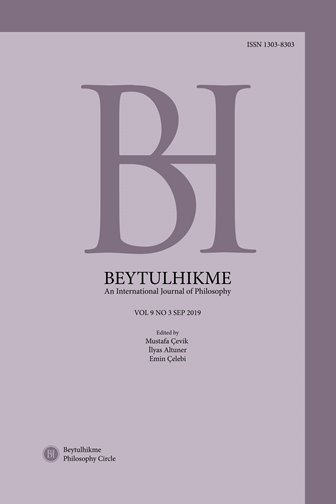Author :
Abstract
Michel Foucault hayatının sonlarına doğru Nietzsche’yi takip edecek şekilde bir kendilik sanatı ya da daha genel olarak “bir varoluş estetiği”nin taslağını çizdi. Bununla, bireyin kendisini bir sanat eserine dönüştürdüğü bir dizi yaratıcı ve deneysel süre ve tekniği anlıyordu. Nietzsche kendini sanat eserine dönüştürme figürü olarak filozof - sanatçıyı görüyordu. Bununla birlikte Foucault 'un tüm çalışmalarının öznenin oluşum tarihi ve bu tarihten sıyrılmanın imkânları üzerine olduğu söylenebilir. Foucault ilk dönem çalışmalarında daha çok insanın özneye dönüştürülme kiplerini ortaya koymuştur. Son dönem çalışmalarında ise bireyin özneye dönüştürme kodlarından sıyrılmasının imkânlarını sorgulamıştır. Bireyin kendini bir kendilik sanatı olarak var kılması bu temel üzerine yükselir. Bu makale Foucault’un son dönem çalışmalarından hareketle bir söyleme başvurmadan kendiliğin sanatı olmanın imkânına odaklanacaktır.
Keywords
Abstract
Towards the end of his life, Michel Foucault followed Nietzsche and outlined “arts of the self” or more generally “aesthetics of existence”. By this, he understood a series of creative and experimental times and techniques in which the individual transformed himself/herself into a work of art. Nietzsche, as well, saw the philosopher/artist as a figure transforming himself/herself into a work of art. However, all the works of Foucault can be said to be the history of the subject and the possibilities of getting out of this history. In his early works, Foucault expounded the modes of transforming people into subjects. In his late works, he has questioned the possibilities of the individual getting out of the transformation codes. The fact that the individual makes himself/herself as an artwork rises on this basis. This article focuses on and inquires the very possibility of being the art of self without narration based on Foucault's late work.
Keywords
- Deleuze, G. (2019). Foucault Üzerine Dersler. (Çev. A. Baran). İstanbul: Otonom Yayıncılık.
- Foucault, M. (1998). Aesthetics, Method, and Epistemology, vol. 2. (Ed. J. D. Fubion, trans. R. Hurley & Others). New York: The New Press.
- Foucault, M. (2005). Özne ve İktidar. (Çev. I. Ergüden & O. Akınhay). İstanbul: Ayrıntı Yayınları.
- Foucault, M. (1987). Söylemin Düzeni. (Çev. T. Ilgaz). İstanbul: Hil Yayınları.
- Foucault, M. (2010) The Government of Self and Others: Lectures at the Collège de Fran- ce 1982-1983. (Trans. G. Burchell). Ne York: Springer.
- Foucault, M. (2011). The Courage of Truth: Lectures at the College de France 1983- 1984. (Trans. G. Burchell). New York: Palgrave Macmillan.
- Foucault, M. (2018). Hakikat Cesareti: Kendini ve Başkalarının Yönetimi II. (Çev. A. Beyaz). İstanbul: İstanbul Bilgi Üniversitesi Yayınları.
- Foucault, M. (2015). Öznenin Yorumbilgisi (Çev. F. Keskin). İstanbul: İstanbul Bilgi Üniversitesi Yayınları.
- Foucault, M. (2012). Doğruyu Söylemek. (Çev. K. Eksen). İstanbul: Ayrıntı Yayınla- rı.
- Luxon, N. (2008). Ethics and Subjectivity: Practices of Self-Governance in the Late Lectures of Michel Foucault. Political Theory, 36 (3), 377-402.
- Platon (2010). Diyaloglar. (Ed. M. Bayka, çev. T. Gökçöl). İstanbul: Remzi Kita- bevi.
- Prado, C. G. (2006). Searle and Foucault on Truth. Cambridge: Cambridge Univer- sity Press.
- Peters, M. A. (2005). Foucault, Counselling and the Aesthetics of Existence. British Journal of Guidance & Counselling, 33 (3), 383-386.
- Simpson, Z. (2012). The Truths We Tell Ourselves: Foucault on Parrhe- sia. Foucault Studies, 13, 99-115.
- Soysal, Ö. (2015). Doğruyu Söyleme Cesareti ve Eleştiri. Felsefi Düşün, 5, 217-274.
- [*] Bu çalışmanın ana teması, 2019 Mayısında Dokuz Eylül Üniversitesi Felsefe Bölümü’nün





